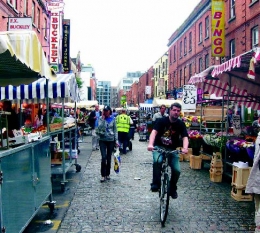It’s a celebrated collision of Dublin old and new, but right now Moore Street isn’t the multicultural paradise that some crack it up to be. CATHERINE REILLY took a stroll...
‘HAIR extensions,”, offers Samuel Max Basay as he casually perches on a stool at a hairdresser on Dublin’s iconic Moore Street.
With his dreadlocks, exotic skin-tone and lean figure, you might think that Samuel lives the bohemian dream, shooting the breeze with the street’s other characters and merrily taking any obstacles as they come. But life is anything but for the Bulgarian-born immigrant.
“When you see people working on the street giving flyers or holding signs, you know they have trouble,” confides Samuel. In his case, the trouble is that he cannot afford a work permit (as a Bulgarian, he needs one). So he sits on a stool seven hours a day repeating “hair extensions” for the princely reward of €20.
And his is not the only hard-luck story on a street once best known for its traditional street traders, but which is now equally associated with a complicated – and sometimes compelling – diversity of Irish, eastern European, African and Asian businesses.
“I have over 20 years’ experience,” Patrick Clemsy, who runs the Sewing Machine Service at No 6 Moore Street, tells a passer-by. Business is bad, the Mauritian later explains to Metro Éireann, and he has taken to the street, handing out his cards. “People don’t want to buy – only food,” he notes.
A neighbouring businessman, Argentinean-born hairdresser Bill Buzo, shares his troubles. But with “Español” and little English, imploring the good people of Dublin into his salon will be quite a task.
Inside No 4, an Irish shop owner, Maureen Hutchison, has fared little better. She sells bags, jewellery and assorted items, and says people can haggle a good deal from her, if they so wish.
An Irish street trader, who refuses to disclose her name, feels the diversity of the street has put native punters off. “It’s dreadful, love,” she replies when asked about Moore Street’s changes. “No Irish people, love, there’s only foreign people coming into it.”
Working in the area for 38 years, she says “no-one” among her associates enjoys the changes, and she harks after the ‘good old days’. “Ah it was great, but people have no manners any more, know what I mean?”
If it’s any consolation, and it probably isn’t, some of the immigrant businesspeople are also displeased at the changes they’ve seen too.
“Moore Street used to be very much popular, but we kind of find junkies coming in, disturbing people,” comments a Nigerian hairdresser owner, who won’t supply her name. “And people aren’t buying, they just look around and go, so it’s not as it used to be.
“In terms of profit making, let me put it this way, business has been bad, which I suppose goes for everywhere as well. The rents have gone up from what it was before. People pay as much as €1,200 weekly, so you find that you are just working for the landlord, you have nothing in the bank. That’s my experience.”
The Nigerian does benefit from the diverse clientele in the area (Irish girls come for hair extensions, Polish girls for plaits) but she’ll be moving on within a matter of weeks. The recession has bitten too hard, rents are high and she can’t get much custom from her fellow Nigerians either.
“I suppose they have friends, cousins who do their hair, and get supplies from home, so they don’t really depend on us,” she explains.
A number of battened-up shops are evident on the street, which is in a state of flux. Earlier this month, plans for a nearby 13-storey building topped by a ‘park in the sky’ were rejected by An Bord Pleanála – which ordered developers Chartered Land to scale back its plans for the 5.5-acre site.
If the proposals of shopping centre developer Joe O’Reilly go ahead, even on a lesser scale, it will certainly present yet another challenge for Moore Street’s traders.
Mary Kennedy, a fruit and veg street trader, has worked in the area for 28 years and really has seen it all. Firstly, she takes a diplomatic stance on the ethnic transformation. “It was a bit awkward when it started, it was awkward for both people, whether you were Chinese, black, Irish. Now, and I can only speak for what’s beside me, coloured people run that shop there and you couldn’t meet nicer people.”
The Dublin woman is also taking the recession in her stride. “You have your good days and bad days. You never know when you come into the street, it could be lashing and you could be busy, or the sun could be shining and you wouldn’t be doing a thing, you know what I mean?
“Every day is totally different to the day before. But it might pick up again as quick. With people losing their jobs, they can’t afford to go to supermarkets and all now. Hopefully it’ll go back to the way it was when our mothers and grandmothers did go to markets and buy.”
Nearly three decades working on Moore Street, you get the impression that the possibility of further flux won’t be keeping Mary awake at night.
“They’re talking about this ‘park in the sky’, but with the recession we’ll all be kicking up daisies before that happens,“ she says laughing. “We’ll be well grown over before that comes around, I’d say.”
At least one thing hasn’t left Moore Street: that classic Dublin wit.












